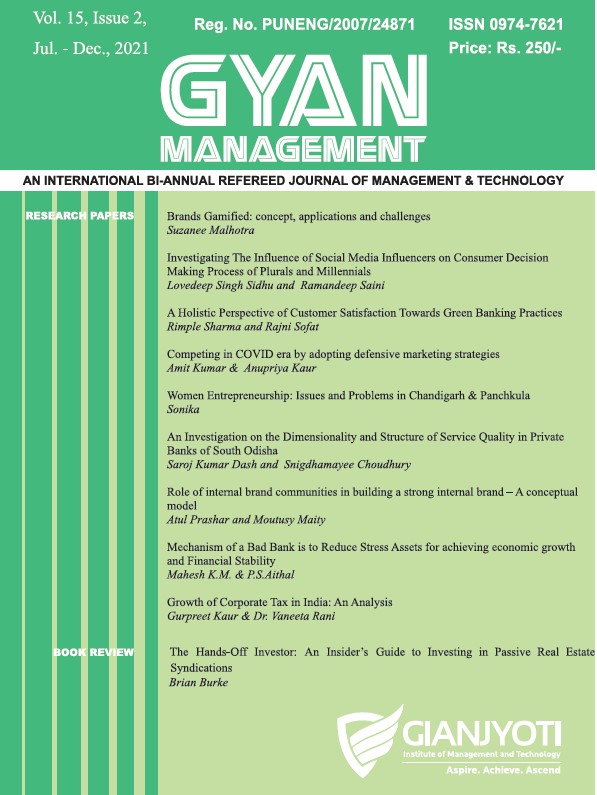Development of Perceived Psychological Contract Violations (PPCV): A Theoretical Study
DOI:
https://doi.org/10.48165/gmj.2023.18.1.6Keywords:
change, transformation, psychological contracts, violations, reneging, incongruenceAbstract
In order to survive in this constantly changing and transforming environment, a business requires agility and a rapid response technique. One heuristic technique that can be focused upon to embrace the said change and bring about a transformation is the understanding of psychological contracts as well as their violations. Psychological contracts are “intangible” contracts that exist at a place of work. Perceived Psychological Contract Violations (PPCV) is a concept that helps to identify and explain the feeling of anger and disappointment that employees face when their needs are not met by the employer. PPCV has two types – Reneging and Incongruence. The purpose of this paper is to develop a theoretical study indicating the identification and development of psychological contracts at the workplace, the subsequently developed perceived psychological contract violations (PPCV), as well as to further explain their types. Efforts have been made to present a thorough study of literature and to brief the results of the same so that there is a better understanding of the given terms. Findings and implications of this framework have been discussed in detail and suggestions for further research have been given.
Downloads
References
Arnold, J. (1996). The psychological contract: A con cept in need of closer scrutiny? European Journal of Work and Organizational Psychology. 5(4). 511-520. https://doi.org/10.1080/13594329608414876.
Bao, Y. & Olson, B. (2011). The effects of psycholog ical contract violation on Chinese executives. The International Journal of Human Resource Management, 22(16), 3373–3392. https://doi.org/10 .1080/09585192.2011.560881.
Blomme, R., Rheede, A. & Tromp, D. (2010). The use of the psychological contract to explain turnover inten tions in the hospitality industry: a research study on the impact of gender on the turnover intentions of highly educated employees. The International Journal of Human Resource Management, 21 (1), 144 – 162. https://doi.org/10.1080/ 09585190903466954.
Cavanaugh, M. A., & Noe, R. A. (1999). Antecedents and consequences of relational components of the new psychological contract. Journal of Organizational Behavior, 20(3), 323–340. https://doi.org/10.1002/
(SICI)1099-1379(199905)20:3<323::AID JOB901>3.0.CO;2-M.
Clutterback, D. (2002). Communication and the psycho logical contract. Journal of communication manage ment, 9(4), 359 – 364. https://doi.org/10.1108/1363 2540510621597.
Collins, A. M., Cartwright, S., & Hislop, D. (2013). Homeworking: Negotiating the psychological contract. Human Resource Management Journal, 23(2), 211-225. https://doi.org/10.1111/j.1748-
2012.00200.x.
Herriot, P., Manning, W.E.G. & Kidd, J. (2002). The Content of the Psychological Contract. British Journal of Management.8(2), 151-162. https://doi. org/10.1111/1467-8551.0047.
Knights, J. & Kennedy, B. (2005). Psychological Contract Violation: Impacts on Job Satisfaction and Organizational Commitment Among Australian Senior Public Servants. Applied H. R.M. Research, 10 (2), 57 – 72. https://pdfs.semanticscholar.org/
a776/79abfa618ddd526b0dac5548a4c6a726602d. pdf.
Majumdar, A. (2020). Relationship between the psycho logical contract and job satisfaction of faculty mem bers in private universities. Journal of Business and
Finance in Emerging Markets. 3(2). 69-84. https://doi. org/10.32770/jbfem.vol369-84.
Morrison, E. & Robinson, S. (1997). When Employees Feel Betrayed: A Model of How Psychological Contract Violation Develops. Academy of Management Review, 22 (1), 226-256. https://doi.org/10.2307/259230.
Robinson, S. & Morrison, E. (2000). The development of psychological contract breach and violation: a lon gitudinal study. Journal of Organizational Behavior, 21 (1), 525 – 546. http://citeseerx.ist.psu.edu/view doc/download? doi= 10.1.1.458 . 7023 & rep=rep1& type=pdf.
Rousseau, D. (2004). Psychological Contracts in the Workplace: Understanding the Ties That Motivate. Academy of Management Perspectives, 18 (1), 35-49. https://doi.org/10.5465/ame.2004.12689213.
Shahnawaz, M. & Goswami, K. (2012). Effect of Psychological Contract Violation on Organizational Commitment, Trust and Turnover Intention in Private and Public Sector Indian Organizations. Vision: The Journal of Business Perspective, 15 (3), 209 – 217. https://doi.org/10.1177%2F097226291101500301.
Thomas, D., Au, K. & Ravlin, E. (2000). Cultural vari ation and the psychological contract. Journal of Organizational Behavior. 24(5). 451 - 471. http:// dx.doi.org/10.1002/job.209.
Turnley, W. & Feldman, D. (1999). The Impact of Psychological Contract Violations on Exit, Voice, Loyalty, and Neglect. Sage Journals – Human Relations, 52 (7), 895 – 922. https://doi.org/10.1177
%2F001872679905200703.
Downloads
Published
Issue
Section
License
Copyright (c) 2023 Gyan Management Journal

This work is licensed under a Creative Commons Attribution 4.0 International License.



